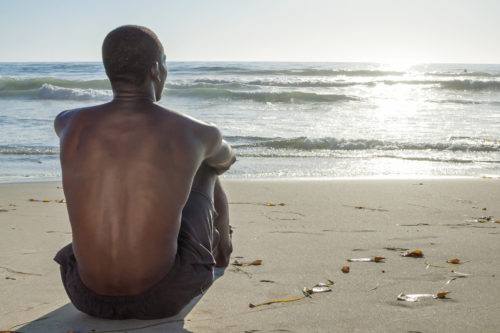Meditation and mindfulness can be valuable allies at times like this. Of course, they don’t keep you free from disease. But they can help you be free(er) from panic, more able to protect yourself, and more in touch with your own inner wisdom and resilience. Here are three examples.
1. Working with anxiety. Obviously, COVID-19 is scary. If you’re personally in a high-risk population, major life changes may be necessary. But even if you’re not—for most younger, healthy adults, the disease might just be a case of the flu, or even just a bad cough—you certainly know someone who is. And while scientists know a great deal about how the coronavirus spreads, no one can predict when it might spread to you, from the next surface you touch or the next person who coughs on the bus. It’s the perfect recipe for anxiety.
This is where mindfulness really can help you notice you’re anxious (which is generally a bad time to make decisions) and can help distinguish justified fear from the extra anxiety produced by the mind.
Take a look. What does fear feel like in the body? Are you feeling it now? OK—that’s fine—we’re not here to judge the fear; only to notice that, hey, when you’re fearful, you might not make the clearest, best decisions. Mindfulness is like a stethoscope you hold to your heart; it lets you know how you’re feeling in a particular moment, so you can figure out what to do next.
Next, see if there’s an actual, immediate threat that requires an immediate response. If not (and usually there isn’t), reach into your meditation toolkit to give yourself a little calm break. Try a short lovingkindness meditation: may we be happy, may we be safe. Or just some mindful breaths.
Finally, check back in. How much of what you’re feeling is anxiety added by the mind to an already difficult situation? Is your mind thinking, or spinning?
Reflect on your own balance between smart precautions and reactive responses. Should you wash your hands more? Definitely; that’s what every doctor is saying. Should you not leave the house for six months? Probably not, depending on your health condition. Should you panic, with the mind spiraling through a hundred terrifying scenarios? Almost definitely not, if you can help it.
Noticing fear, accepting it, calming a bit, distinguishing between fear and anxiety—these are mindfulness “superpowers” that you can develop with a little practice.
2. Building healthy habits. Mindfulness also helps you take some of those smart steps that doctors are suggesting right now. For example, next to washing your hands, the most helpful individual act you can do to keep the coronavirus out of your lungs is ridiculously simple: Stop touching your face.
Simple, but not easy. Most of us touch our faces dozens of times a day, usually without thinking about it. I bet that a lot of you, reading these words, want to do it right now. Saying “don’t touch your face” is like saying “don’t think of a pink elephant.” As soon as you hear the words…. Oops.
Now, mindfulness wasn’t invented for this purpose—but it sure can help. You can, in fact, turn not-touching-your-face into a practice. Here’s how:
First, notice the urge to touch your face when it arises: Oh! There’s the impulse to touch my face! And then, check in to see how that urge feels in the mind or body. Maybe it’s an awkward discomfort in the mind. Maybe it’s an actual itch. Either way, just like you might “sit with” moderate knee pain or back pain in meditation, just “be with” the desire, rather than indulge it. OK, here’s what it feels like to not touch my face. Weird.
It is weird. It’s like not scratching an itch. It can be maddening. But from a mindfulness point of view, it’s just another thing to notice, allow and let be. Eventually it passes. It can even be a game.
The same is true for other healthy habits, like washing your hands for 20 seconds, which is longer than most of us take. When washing your hands, wash your hands. Feel the water, take a breath, feel your feet on the floor—pretty soon, 20 seconds will be up. (You could also do a short lovingkindness meditation: may all beings be healthy, may all beings be happy, may all beings be free.)
Applying mindfulness in this way gives you a double benefit. Most importantly, these mindful habits improve your chances of staying healthy. But as a bonus, they also build your mindfulness capacity each time you do them.
3. Growing wisdom. The biggest benefit of meditation in a time of uncertainty, though, is wisdom. Remember, mindfulness was originally developed more than 2,500 years ago to help people be happy in an unpredictable, uncertain world in which suffering is unavoidable.
Of course, we all want to hold onto the good stuff and push away the bad stuff, but life doesn’t work that way. The coronavirus epidemic is one more awful reminder of that. No one wants this, but here it is. It’s not good. Now how can I respond wisely, compassionately and carefully?
Using mindfulness to build resilience, calm, compassion and awareness will help us do the best we can under the circumstances. It will strengthen the better angels of our nature and lower the chances that we react out of fear or panic. It will give you the space to make smart decisions and care for those around you. It will help.
There is no escape from coronavirus, just as there is no escape from the precariousness of human life. We’re all in this together. So, it seems like a good idea to try to help one another, to stay as balanced and resilient as possible and to do the best we can in a challenging situation. Which is, of course, also true of life itself.






